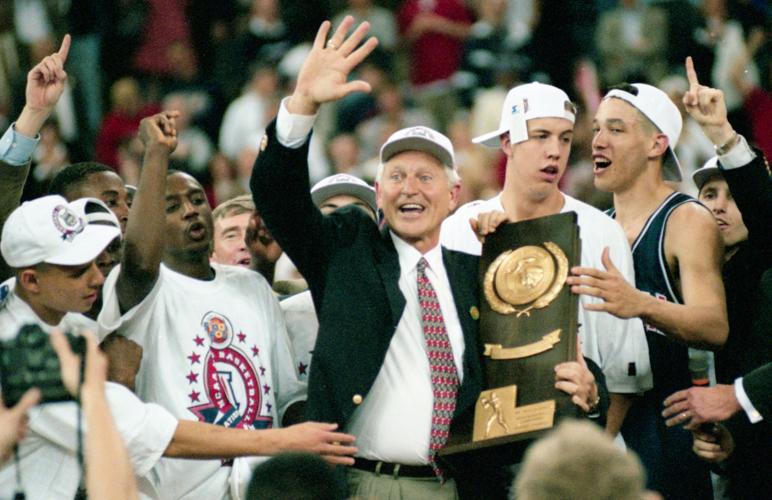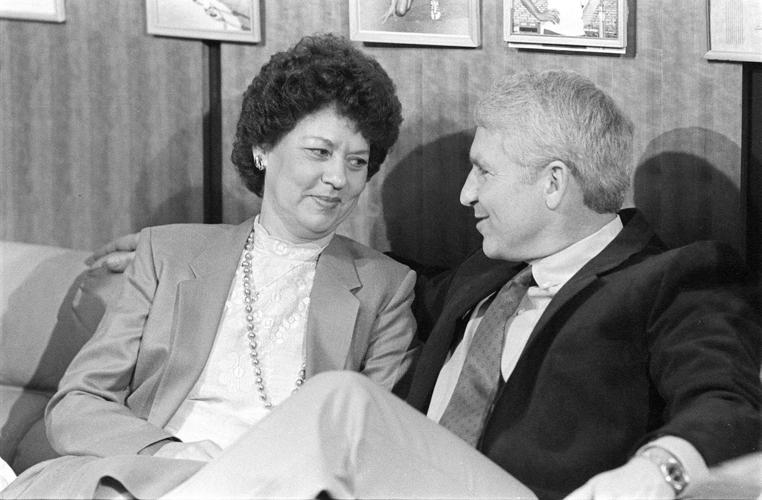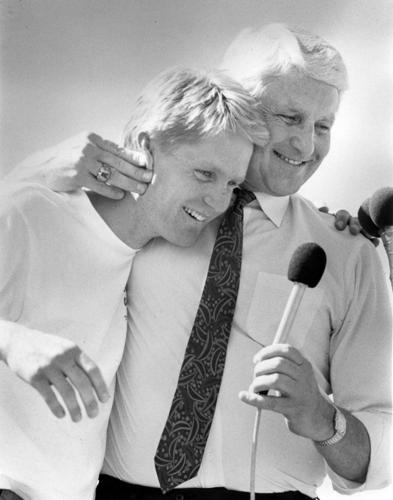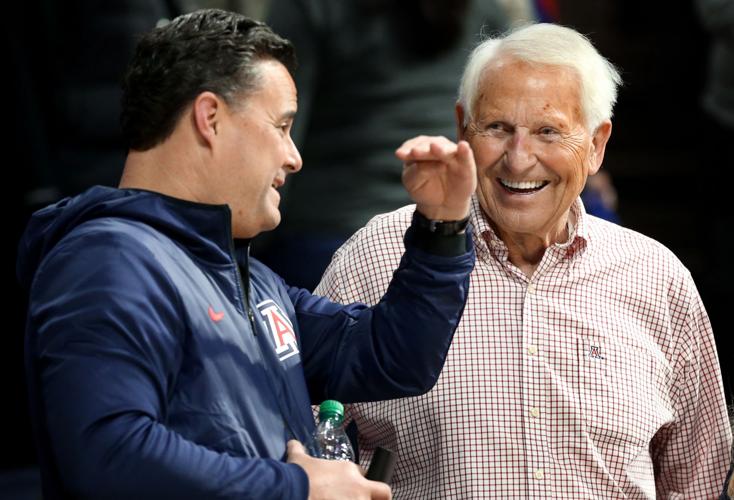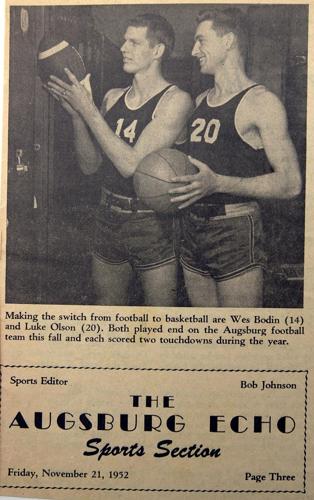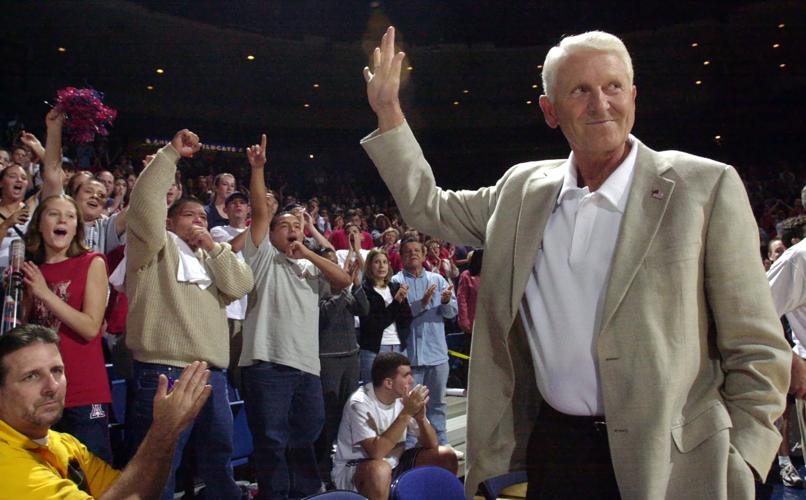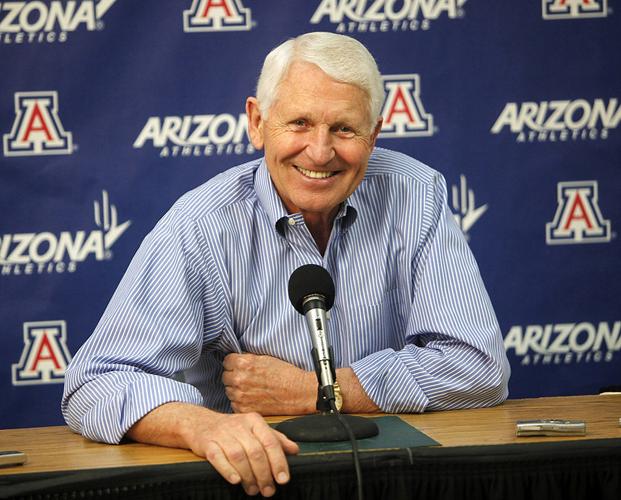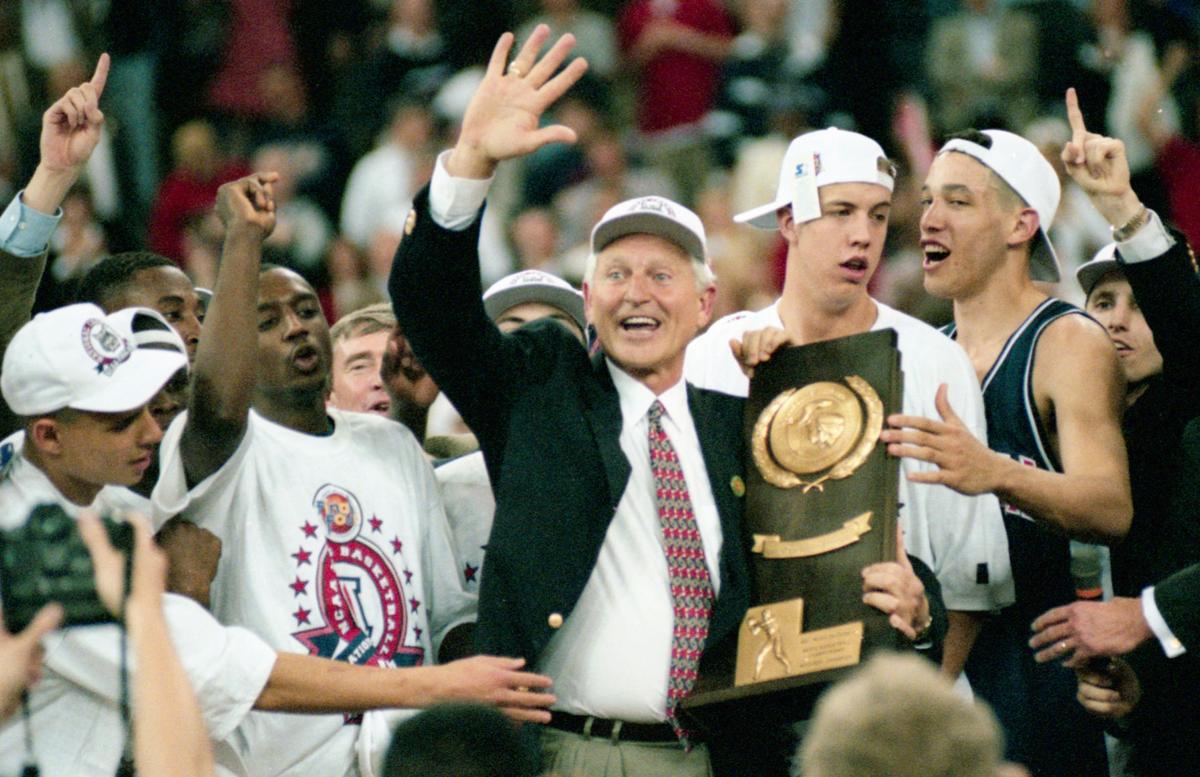Lute Olson, who drew decades of national attention to Tucson and the University of Arizona by turning the school’s basketball program into a perennial power, died Thursday night.
Georgia Tech basketball coach Josh Pastner, a former UA player and assistant coach, said Olson was, simply, "the best."
"He’s one of the greatest human beings ever. He’s unbelievable. There’s no words that can express my appreciation, my gratefulness for him. He literally built the basketball program and the city," he said. "I watched him every step of the way in how he coached and how he handled himself. He demanded excellence. He was tough on guys, but every player who played for him loved him. God bless him and his family.”
Arriving in Tucson from the University of Iowa in 1983, Olson became the most successful basketball coach in UA history over his 24 seasons with the Wildcats before retiring in 2008 amid health concerns. Named to the Naismith Basketball Hall of Fame in 2002, Olson led the Wildcats to the 1997 NCAA title, still the crowning moment to date in UA athletics history, along with three other Final Fours and 22 NCAA Tournament appearances.
Overall at Arizona, Olson went 589-187 overall and won 11 Pac-10 championships. Olson also produced 35 players taken in the NBA Draft, including 14 lottery picks.
"He had no weaknesses as a coach," said UA coach Sean Miller, who replaced Olson permanently in 2009 after the program had interim coaches for two seasons. "He was a tremendous teacher of the game. He was a relentless recruiter. He was an astute evaluator of talent. He was a fierce and confident leader. He was more than a coach to all of his players."
Olson’s presence in Tucson also spread well beyond the McKale Center floor, which is named after Olson and his first wife, Bobbi. Perhaps Tucson’s most recognized celebrity at the height of his career, Olson made frequent appearances around town and in commercials, during and after his retirement.
Over time, Tucson and UA tugged back at him. Olson twice turned down overtures to coach at the University of Kentucky and, when a statue of him was unveiled outside McKale Center in 2018, explained why he arrived to take over a 4-24 team at UA after nine successful years at Iowa in the late 1970s and early 1980.

University of Arizona men's basketball coach Lute Olson speaks to the media in 2009 during an open topic press conference after stepping down as coach.
“When people talk about me coming here in ’83, I ask them, 'Have you ever spent nine winters in Iowa City?'” Olson said.
Olson also spoke proudly of his post-retirement work for the UA Foundation, where he served as an ambassador, traveling around the country to appear at functions involving the school’s fundraising arm.
“That’s really kept me tied in with the university,” Olson said in 2014. “That job entails seeing a lot of different people, whether it’s for engineering, Eller College, Judaic Studies or something else.
“I’ve had a lot of questions about, 'Do I miss coaching?’ Frankly, the only thing I’ve missed about coaching is the practice, to be with the kids and have some effect on their lives.”
From his 2008 retirement until the 2018-19 season, Olson had also been a regular in the McKale Center stands, sitting midway up in the lower section across from the UA bench along with his wife, Kelly.
His well-groomed hair was easy to pick out there. So, too, is the hair on the statue outside of McKale Center, where Olson is shown holding the 1997 NCAA trophy and beaming.
“The hair was right,” Olson said at the statue’s unveiling, drawing laughter from the dozens of former players, donors and staffers who attended the event at the Jim Click Hall of Champions on the north side of McKale Center.
During a speech beforehand, though, Olson also made it clear that the honor was not just his.
“I think it’s a great tribute to the players who went through this program, because I didn’t make one basket,” Olson said.
His former players told a different story, crediting Olson for developing them on and off the court.
“We used to go out to restaurants that I couldn’t pronounce,” said former UA star Damon Stoudamire, now the head coach at Pacific. “We’d always go out to dinner (on road trips) and at coach’s request we had to wear slacks and a collared shirt. I didn’t really want all that. I really just wanted a burger.
“But what I learned was etiquette. Coach was trying to teach us something bigger that we couldn’t see at the time.”
Stoudamire said the experiences began paying off already as a senior, when he attended several formal postseason awards ceremonies for his all-American play in 1994-95. And while Stoudamire said he still thinks of what Olson would do in some situation when he’s coaching the Tigers, former UA guard Matt Muehlebach does the same thing in his Tucson attorney’s office.
“His attention to detail, his preparation — I think about that every day as a lawyer,” Muehlebach said. “The preparation with Lute was as good as I’ve ever seen.”

Lute Olson talks with wife Bobbi before he was announced as the new UA basketball coach on March 29, 1983.
Olson was also known for his manner of motivating players without using curse words. Just a glare, with arms crossed, was often enough.
But underneath it all, his players grew to know Olson was just trying to get the most out of them. Because he cared.
“I didn’t really understand true hard work until I got here,” said Pete Williams, one of UA’s first standout players under Olson in the 1980s, during Olson’s statue unveiling.. “When you talk about Arizona basketball and a family, it’s a family in every sense of the word. Love you coach.”
While Arizona held several “Lute Olson All-Star Games” at McKale Center toward the end of his career, bringing back former players for a McKale Center scrimmage, the coach also lent his name to a fantasy camp that Williams and many other former UA players worked every September.
When Olson turned 80 in 2014, former UA player Harvey Mason arranged a surprise birthday party. Former Wildcats such as Steve Kerr, Sean Elliott, Kenny Lofton, Anthony Cook, Joe Turner, A.J. Bramlett, Channing Frye, Jason Terry, Miles Simon and Luke Walton also showed up.
“I’m just happy that I’m healthy and that the family and grandkids are all healthy,” Olson said afterward. “It’s a been a good 80 years, I guess. A lot of really nice young men have gone through the programs I’ve been in. I feel good about it.”
After news of Olson's death spread Thursday evening, many former Wildcats posted condolences and stories about Olson's influence on him. Included, of course, was Warriors coach and former UA star Steve Kerr, whose jersey hangs on the McKale Center walls.
"It’s hard to put into words how much Lute Olson meant to me," Kerr tweeted. "He was an amazing coach and a wonderful man. Being part of the U of A basketball family changed my life forever. I will never forget 'Coach O,' those awesome nights at McKale and all my teammates."

Arizona men's coach Sean Miller, left, chats with former coach Lute Olson at halftime of the women's game against Northern Arizona at McKale Center, Friday, Dec. 21, 2018, Tucson, Ariz.
Olson kept coaching until just after his 73rd birthday in 2008, and made it clear he wanted to coach longer. He left the Wildcats in October 2007, announcing he was taking an indefinite leave of absence for what he called a “medical condition that is not life threatening,” and wound up missing the entire 2007-08 season while Kevin O’Neill served as interim head coach.
Olson cited “stress and anxiety” for the leave of absence. He was also going through a divorce with his second wife, Christine, that was finalized in the spring of 2008, when he announced he would return to coaching. He ultimately retired in October 2008.
Olson said the difficult times actually started with the death of his first wife, Bobbi, of ovarian cancer in 2001. They had been married for 47 years and had five children.
“There’s always a lot of stress in coaching, and in the second marriage there was a lot of stress involved,” Olson said. “But (now) I’ve felt pretty much relieved of any stress. It was a really difficult thing to go through with Bobbi’s death, and the pain and suffering and the second marriage. But other than that, everything has gone well.

University of Arizona basketball coach Lute Olson with starting guard Steve Kerr in during a campus celebration of the team's 1988 NCAA Final Four appearance.
Olson returned to coach in April 2008 but retired permanently six months later, and Russ Pennell served as interim head coach in 2008-09 before Miller took over the Wildcats in 2009-10.
In the days following his retirement, Olson’s personal physician, Stephen Knope, said the coach had suffered a small stroke in the previous year, one that likely resulted in depression and changes in judgment. That stroke occurred in Olson's frontal lobe, Knope said, an area that controls executive function and serves as a center for personality.
“In retrospect, (the effects) probably didn't appear for several months," Knope said then.
At the time, Olson's doctors said he had also been diagnosed with atrial fibrillation, or abnormal heart rhythm, likely as a result of the stroke. Olson has for years dealt with a familiar tremor, which causes involuntary shaking and a trembling voice.
However, Olson said he felt good about his health after turning 80 in 2014.
“I don’t need glasses, other than for reading, and my blood pressure is 110 over 70,” Olson said. ““I’ve been fortunate to have a long life of good health with the exception of the stroke that ended my coaching career. And that was just in the frontal lobe, so I had no effects from that other than just to get through the mental part.”
Health issues did severely impact Olson’s early family life. His father, Albert, died of a stroke after giving his children haircuts before going to church on a Sunday when Lute was 5 years old. Nine months later, Olson’s brother, Amos, died in a tractor accident shortly after returning home from Mayville State University to run the family farm.
Olson went on to graduate from Grand Forks High School in North Dakota, where he became known as “Leaping Luke” while leading his team to the state title. There, he also met his first wife, Bobbi, who became a beloved figure within the Arizona basketball program until her death of ovarian cancer in 2000.
Lute and Bobbi Olson married on Thanksgiving 1953, when Lute was a sophomore at Minnesota's Augsburg College. There, he played football and basketball for four years and baseball as a senior, when he was named the school’s athlete of the year.

Lute Olson (right) with friend Wes Bodin as they appeared in the Augsburg College school paper on Friday, November 21, 1952, Lute's freshman year at the Minneapolis school where he majored in History.
Olson then began a 13-year tour of coaching high school basketball in Minnesota and Southern California, stepping away from the game for the 1961-62 season to become a high school counselor in Boulder, Colorado.
In 1969, Olson moved from Marina High School in Huntington Beach, California, to take over as coach at Long Beach City College, where he spent four years before taking over for Jerry Tarkanian at Long Beach State.
Olson spent only one season at Long Beach State before he was hired at Iowa, and he reached national prominence by leading the Hawkeyes to the 1980 Final Four. Arizona hired him away three years later and soon after, made NCAA Tournament appearances an expectation for Wildcats fans.
Arizona made its first NCAA Tournament under Olson in his second year, 1984-85, then played in 13 more — capped by the 1997 national championship — before its 1999 appearance was vacated because of an NCAA violation.
Known to be particularly skilled as a talent evaluator and talent developer, Olson jumpstarted the Wildcats by signing the lightly recruited Steve Kerr and Cholla High School star Sean Elliott. After those two led the Wildcats to the 1988 Final Four, captivating Tucson, he was able to attract more high-level talents to build UA into perennial powers.
“Thank goodness for Sean Elliott,” Olson said. “Then it took a while until we had another Arizona guy who affected the program — Richard Jefferson and (Mike) Bibby. Arizona was not known for having a whole lot of high-level Division I players. But I had been in California for 20 years, so I had contacts, and Josh (Pastner) had contacts in Texas, so we were able to get things going.
“I know we had some local mothers upset that we didn’t take their sons, but the worst thing you can be is to be from the area, come in on scholarship and not get in the games.”
Meanwhile, Olson also led USA Basketball team to a gold medal in the 1986 World Championships, a triumph that helped lead to his 2002 Hall of Fame induction. The team was the last U.S. team to enter the World Championships with only amateur players, including Kerr and former UA teammate Elliott.
After the U.S. swept through favored opponents from Yugoslavia, Brazil and Russia to win the gold, Olson said of the medal: “It looks pretty good, doesn’t it? My feeling is one of elation.”
Lute Olson was head basketball coach at the University of Arizona from 1983-2008. He was a seven-time Pac-10 Coach of the Year, made five Final Four appearances, won the 1997 NCAA Championship and was inducted into the Basketball Hall of Fame in 2002. He died Aug. 27, 2020.
Eleven years later, Olson reached the pinnacle of college success, with the Miles Simon-led Wildcats winning the NCAA Tournament by knocking off three No. 1 seeded teams — Kansas, North Carolina and Kentucky — after trailing South Alabama by 10 in the first round.
The Wildcats needed overtime to beat Providence (in the Elite Eight) and Kentucky (in the championship game) and when the last buzzer sounded, Simon clutched the ball tightly and light-hearted Bennett Davison ran over to tussle Olson’s famously well-coiffed hair.
“This is one tough group of Cats,” Olson said.
Arizona just missed another championship in 2001, reaching the title game when an injury to star guard Gilbert Arenas plague the Wildcats, and nearly returned to the Final Four with close Elite Eight losses in both 2003 and 2005.
Olson coached to the NCAA Tournament every year through 2007, after which he took the 2007-08 season off and retired for good just before the 2008-09 season was to begin. The Wildcats made those two postseason coaches under interim coaches Kevin O’Neill and Russ Pennell but the 2007-08 appearance was vacated because of an NCAA violation.
After he retired, Olson remained a visible sight at UA home games until the 2018-19 season, while working for the UA Foundation. Even in 2016, at age 82, he went to Boston to help generate support the UA Foundation’s Arizona NOW campaign to raise $1.5 billion.
“The main thing is it brings people there who are interested in athletics,” Olson said then. “It’s not a case of speaking but of doing a lot of Q&A. But I enjoy doing that. It keeps me connected, and the money raised goes to (academic programs). Very little of it is for athletics.”

University of Arizona basketball coach Lute Olson waves to the crowd as he is introduced during the midnight madness practice game at the McKale Center on Oct. 12. 2001.
But after Olson suffered another stroke in February 2019, he was less active. Olson was admitted to Banner University Medical Center-Tucson after the most recent stroke. David Labiner, chairman of the UA department of neurology, said Olson was "expected to make a full recovery but will likely need some rehabilitation therapy after his discharge from the hospital.”
The hospital offered no further details and Olson had kept a low profile since then. He did host several former UA players at his house for dinner in August 2019, when they were in town to work the Lute Olson Fantasy Camp at the Sporting Chance facility.
Former UA standout Reggie Geary, now a UA developmental staffer, posted a photo on Instagram from the dinner with Olson surrounded by former players Salim Stoudamire, Bennett Davison, Joe Turner, Kyle Fogg, Craig McMillan, Ben Davis, A.J. Bramlett, Corey Williams, Donnell Harris, Pete Williams, Muehlebach, Geary and Matt Brase — Olson's grandson and a former player.
Everyone in the photo had arms wrapped around their shoulders.
“Any reason to come to Tucson is great,” said Williams, a standout on Olson’s first UA teams in the mid-1980s who now is a probation officer in Southern California. “But this is really about a chance to see 'Coach O.'”
For Salim Stoudamire, a former NBA player who is Damon’s younger cousin, the appearance was his first at the camp, which was geared toward longtime adult fans of Olson and the Wildcats. He said seeing Olson was a major motivation to attend.
“It’s been tough lately, with a lot going on in my life and a lot in his life,” Stoudamire said then. “But I’m always there for him. Obviously, I came to see him. I pray that his future is bright. All I can do is add positive energy.”
Olson’s last known appearance at McKale Center came on Feb. 7, 2019, when he sat in Tucson attorney Burt Kinerk’s seats across from the UA bench while the Wildcats hosted first-place Washington. Two months earlier, he had been honored at a UA women’s game at McKale Center, on the floor that bears his name with the memory of a long and proud chapter in Arizona sports history.
“Coach Olson is not only an icon of our men’s basketball program and all of college basketball, but he is also an embodiment of greatness to Arizona Athletics, the University of Arizona and the Tucson community,” UA said in a statement after Olson’s 2019 stroke was disclosed. “Our thoughts are with Coach Olson, his family and loved ones during this time.”
Olson’s stamp on Arizona sports history won’t be forgotten. Not only is McKale Center floor is named “Lute and Bobbi Olson Court,” but his statue remains outside the north end of McKale Center.
There, fans congregate before and after athletic events, or peer inside to the Hall of Champions to replay great UA sports moments.
It’s a fitting spot.
“It’s a great opportunity to have the statue right there so people can walk by and share their stories — about what kind of coach he was, the legacy that he left here but also what he did, how he mentored and coached,” Arizona AD Dave Heeke said during the statue’s unveiling. “It’s a noble cause, the ability to impact people’s lives. That’s what coach Olson did.”
Photos: Arizona Wildcats basketball coach Lute Olson
Lute Olson
Updated
UA basketball head coach Lute Olson and player Sean Elliott during their game against USC in 1989.
Lute Olson
Updated
Lute Olson playing guard in football in 1955.
Lute Olson
Updated
Lute Olson as a junior in high school in 1951.
Lute Olson
Updated
Lute Olson (right) with friend Wes Bodin as they appeared in the Augsburg College school paper on Friday, November 21, 1952, Lute's freshman year at the Minneapolis school where he majored in History.
Lute Olson
Updated
Rookie coach: Lute Olson knew his X's and O's in his first job at Mahnomen High in 1956-57, and, as a yearbook photo suggests, won over players and bosses with his personality.
Lute Olson
Updated
Lute Olson, head coach Marina HS, Huntington Beach, Calif. 1967-68.
Lute Olson
Updated
Lute Olson as head coach of his 1970-71 Long Beach Community College basketball team.
Lute Olson
Updated
Iowa head coach Lute Olson, center, and his assistant coaches leap off the bench in disbelief after the referees failed to call traveling against Villanova during Friday night's NCAA Midwest Regional semifinal game in Kansas City, Mo., on March 25, 1983.
Lute Olson
Updated
Lute Olson talks with wife Bobbi before a press conference in which he will formally become the new head coach of men's basketball at the U of A in 1983.
Lute Olson
Updated
When Olson joined the UA in 1983, he brought with him a commanding presence. "When he walks over to his office with you," one player said, "you feel like you're with the president."
Lute Olson
Updated
Lute Olson talks to his players during practice at McKale Center in 1983.
Lute Olson
Updated
Fans of coach Lute Olson in McKale Center in 1984.
Lute Olson
Updated
Lute Olson (center) coaching his 1984 squad.
Lute Olson
Updated
University of Arizona basketball coach Lute Olson during a press conference in 1985.
Lute Olson
Updated
At the opening gala for Loews Ventana Canyon Resort, on April 27, 1985, Mrs. Bobbi Olson talks with Willard Scott as her husband and University of Arizona basketball coach, Lute Olson, looks on.
Lute Olson
Updated
University of Arizona basketball coach Lute Olson gathers his players together during a time out against Alabama on March 15, 1985.
Lute Olson
Updated
Arizona coach Lute Olson coaching at his youth basketball camp in 1985.
Lute Olson
Updated
Arizona coach Lute Olson at a charity bike event in 1987 with assistant Kevin O'Neill, far left, and player Harvey Mason, far right.
Lute Olson
Updated
Arizona State head coach Bill Frieder, left, and University of Arizona head coach Lute Olson appeared in several funny commercials for Valley National Bank in the mid-1980s.
Lute Olson
Updated
Recovering from knee surgery, Steve Kerr gets a visit from University of Arizona basketball coach Lute Olson and teammate Sean Elliott at the St. Mary's pediatric ward on July 22, 1986 in Tucson. Margo Brennan, who would become his future wife, sits by Kerr's side. Olson awarded Kerr, who was on the USA Basketball team, with the Gold medal from the FIBA World Championship game in Spain where he was injured. Because of the injury Kerr missed the entire 1986-87 season. Photo by Charlie Leight / Arizona Daily Star
Lute Olson
Updated
Arizona head coach Lute Olson donned a cowboy hat for the Tucson Rodeo in 1988.
Arizona vs. Oklahoma / 1988 NCAA Final Four
Updated
Arizona basketball coach Lute Olson during open practice prior to the NCAA Final Four semi-final against Oklahoma on April 2, 1988, in Kansas City, Mo.
Arizona vs. Oklahoma / 1988 NCAA Final Four
Updated
Arizona basketball coach Lute Olson eschews autograph seekers prior to the NCAA Final Four semi-final against Oklahoma on April 2, 1988, in Kansas City, Mo. Olson was 0-3 in the NCAA Tournament in his first four seasons with the Wildcats before the magical 1987-88 run, when UA advanced to its first Final Four.
032522-tuc-spt-elliott-p3
Updated
Coach Lute Olson is beaming while listening to star player Sean Elliott at a rally and parade for the 1988 UA men's basketball team, which made the Final Four.
Lute Olson
Updated
Coach Lute Olson with player Steve Kerr, now the coach of the Golden State Warriors, at a rally and parade for the men's basketball team at University of Arizona stadium in Tucson after the 1988 NCAA Final Four.
Lute Olson
Updated
Arizona Coach Lute Olson in his office in Sept. 1988, with the Pac-10 Trophy (foreground). The team made it into the 1988 NCAA Final Four earlier in the year.
Lute Olson
Updated
A tense Lute Olson watches from the bench during a game in 1989.
Lute Olson
Updated
Arizona head coach Lute Olson reacts to an official's call at McKale in January, 1989.
Lute Olson
Updated
Arizona coach Lute Olson, left, during a tense moment versus Washington State during the Pac-10 Tournament at the Forum in Los Angeles in 1989.
Lute Olson
Updated
Coach Dale Brown of Louisiana State University, chatting with University of Arizona head coach Lute Olson during a basketball game at McKale Center, Tucson, on Dec. 7, 1991.
Lute Olson
Updated
Arizona State coach Bill Frieder chats with friend Lute Olson, head coach of the University of Arizona, in 1991.
Lute Olson, Kenny Lofton
Updated
Former University of Arizona basketball player Kenny Lofton, left, greets coach Lute Olson at a Cleveland Indians baseball spring training game at Hi Corbett Field on March 31, 1992.
1994 Arizona Wildcats Final Four basketball team
Updated
Arizona coach Lute Olson and star point guard Damon Stoudamire embrace during the 1994 NCAA Final Four in Charlotte, N.C.
Lute Olson
Updated
Arizona head coach Lute Olson smiles in front of cheering fans at Arizona Stadium on April 5, 1994, after returning from the Final Four in Charlotte, NC.
Lute Olson
Updated
Matt Brase, then in the seventh grade, celebrates Christmas 1994 with Lute Olson, his grandfather.
Lute Olson
Updated
Michael Dickerson and Lute share a moment near the end of the game against North Carolina in the Final Four in 1997.
Lute Olson
Updated
Lute Olson and the Wildcats celebrate during the end of the second half of their NCAA Final Four Championship game against Kentucky in Indianapolis in 1997.
Lute Olson
Updated
Arizona coach Lute Olson holds up the net for the fans after Arizona beat Kentucky 84-79 in overtime to win the national championship Monday, March 31, 1997, at the NCAA Final Four tournament in Indianapolis.
Lute Olson
Updated
UA head coach Lute Olson hold the Divsion I NCAA Championship trophy with his team from left; Jason Lee, Miles Simon, Jason Terry, Lute, Justin Wessel, and Bennett Davison after they defeated Kentucky in the 1997 Final Four in Indianapolis.
Lute Olson
Updated
Lute Olson and wife, Bobbi Olson wave to fans after the Wildcats won the NCAA National Championship in Indianapolis in 1997.
Lute Olson
Updated
"You could make a fortune!" Jay Leno told Lute Olson during "The Tonight Show", handing him a can of 'Lute Spray." Just say "One spray, and you too can be a wildcat." Olson appeared on the show on April 2, 1997, after the team won the NCAA National Championship.
Lute Olson
Updated
Sakura chef Steve Yim and Wildcat guard Jason Terry watch as UA coach Lute Olson adds egg to fried rice during the Lute Olson Celebrity Chefs benefit in Nov. 1997.
Lute Olson
Updated
In this 1998 photo, Cheryl Bell, Steve Tobias, Patrick Coco, Tom Alexander and Brian Ralston are all sporting the new" Lute lids" a rubbery white hair piece that is suppose to make you look like Lute Olson.
Lute Olson
Updated
Arizona coach Lute Olson, left, his wife Bobbi, former athletic director Cedric Dempsey, AD Jim Livengood and university president Peter Likens during a ceremony at a game at McKale Center on Feb. 26, 2000.
Lute Olson
Updated
UA's head basketball coach Lute Olson and his wife Bobbi share a moment before unveiling the new floor to McKale Center in a post game ceremony in 2000.
Lute Olson
Updated
UA basketball head coach Lute Olson (right) has five talented freshmen for the 2001 season, including Channing Frye, Isaiah Fox, Dennis Latimore, Salim Stoudamire and Will Bynum. Photo by David Sanders.
Lute Olson
Updated
University of Arizona basketball coach Lute Olson waves to the crowd as he is introduced during the midnight madness practice game at the McKale Center on Oct. 12. 2001.
Lute Olson
Updated
UA head coach Lute Olson with legendary UCLA basketball coach John Wooden get ready to present the Wildcats with the Wooden Classic trophy after UA defeated Purdue in 2001.
Lute Olson
Updated
Lute Olson checks on Loren Woods after Woods hurt his ankle during practice in the Alamodome in San Antonio,Texas, during the NCAA Tournament in 2001.
Steve Kerr
Updated
Former University of Arizona stars Steve Kerr (left) and Sean Elliott greet UA coach Lute Olson in March, 2001.
Arizona Wildcats in NCAA Tournament
Updated
Lute Olson reacts during the first half of UA vs. Duke NCAA Championship in Minneapolis, MN, April 2, 2001.
A look back at UA Commencement ceremonies
Updated
University of Arizona head basketball coach Lute Olson, who gave the commencement speech to UA's 124th graduating class May 12, 2001, laughs as he recalls how preparing for this speech was harder than preparing for Illinois, Michigan State, and Duke, all teams that UA had to play against in the this year's Final Four.
Lute Olson
Updated
Members of the Naismith Basketball Hall of Fame, Class of 2002, pose with their Hall of Fame jerseys, from left, Earvin "Magic" Johnson, coaches Lute Olson and Kay Yow, Biserka Petrovic (the mother of the late Drazen Petrovic), coach Larry Brown and Tex Harrison (representing the Harlem Globetrotters) on Wednesday, June 5, 2002, in Los Angeles.
Lute Olson
Updated
Friends and fans in the foreground wait for a memorial service for Lute Olson's wife, Bobbi, at McKale Center in 2001. Bobbi died after a long battle with cancer.
Lute Olson
Updated
University of Arizona basketball coach Lute Olson reacts to a foul called by referee on Channing Frye during the NCAA Tournament on March 22, 2002
Lute Olson
Updated
University of Arizona basketball coach Lute Olson signs autographs at Myers Ganoung Elementary school on May 7, 2002.
Lute Olson
Updated
Lute Olson talks with Channing Frye during a game against sixth-ranked Kansas at Allen Fieldhouse in 2003.
Lute Olson
Updated
UA coach Lute Olson and his assistants rally the Wildcats in their game against Gonzaga during the 2003 NCAA Tournament in Salt Lake City.
Lute Olson
Updated
Photo Illustration of Lute Olson and various stages in his life. Left to right: A junior in high school, playing football and basketball in college, his first coaching job, coaching at California, Iowa, and UA with Sean Elliott, winning the NCAA national title.
Lute Olson
Updated
An agitated Lute Olson stomps partially out onto the court during the run of play after his University of Arizona players failed to score on a possession in the second half against Mississippi State at the Arrowhead Pond in 2004.
Lute Olson
Updated
Lute Olson answers a question during a Hollywood Squares type sketch performed by members of the 1988 basketball team during the All-Star dinner Saturday, Aug. 13 2005, at the Westin La Paloma.
Lute Olson
Updated
UA's Lute Olson doesn't agree with a call in the first half against Memphis during the Chase Fiesta Bowl Classic at McKale on Dec. 20, 2006. UA won 79-71.
Lute Olson
Updated
U of A head coach Lute Olson calls a play from the sidelines in the second half against Oregon at McKale Center in 2007.
Lute Olson
Updated
UA head coach Lute Olson talks with former player Jason Gardner at a party at Lutes house in 2005.
Lute Olson
Updated
Arizona head coach Lute Olson reacts to a foul against the Wildcats during the second half at John Paul Jones Arena in Charlottesville, Virginia in 2006.
Lute Olson
Updated
UA head basketball coach Lute Olson reacts after crossing the finish line with his wife Christine Olson during the Holualoa Tucson Marathon in Dec. 2006.
Lute Olson
Updated
Coach Lute Olson grimaces upon hearing that his University of Arizona team landed a No. 8 seed at the 2007 NCAA Tournament. He was watching the show at the Stadium Club at Arizona Stadium with his wife, Christine.
Lute Olson
Updated
In 2007, Arizona basketball coach Lute Olson took the Wildcats to their 23rd consecutive NCAA tournament, the second-longest streak ever. At Tucson International Airport, Olson headed for a chartered flight Wednesday that took the team to New Orleans for a first-round game against Purdue.
Lute Olson
Updated
A tired Lute Olson talks in April, 2008, about his return to coaching after a leave of absence.
Lute Olson
Updated
Former Arizona men's basketball coach Lute Olson speaks to the media in 2009 during an open topic press conference after stepping down as coach.
Lute Olson
Updated
Former UA basketball coach Lute Olson and daughters Christi Snyder, left, and Vicki Olson, right, laugh as he is honored at Lute and Bobbi Olson Court in McKale Center in 2009.
Lute Olson
Updated
Former University of Arizona Head basketball coach Lute Olson stands with daughters, Vicki Olson, left, and Christi Snyder, right, while they watch a half time celebration to honor Olson at McKale Center in March, 2009.
Lute Olson
Updated
Sean Miller greets Coach Olson in McKale center for the press conference to announce Miller as the new head coach in 2009.
Lute Olson
Updated
Former head coach Lute Olson, Damon Stoudamire and Olson's wife, Kelly Olson joke around following a press conference in 2013 to announce Stoudamire's appointment as an assistant to Sean Miller.
Lute Olson
Updated
Former Arizona head coach Lute Olson greets old friends and checks out the action during an open practice for the second round of the NCAA 2011 Division 1 Men's Basketball Championship at McKale Center in Tucson, Ariz., on March 16, 2011.
Lute Olson
Updated
Lute Olson watches a University of Arizona basketball game in 2013.
Lute Olson
Updated
Jason Terry stands with former head coach Lute Olson as his jersey number is retired during halftime at McKale Center in Tucson on Feb. 19, 2015.
Lute Olson
Updated
Former Arizona head coach Lute Olson and his wife Kelly Pugnea are two red shirts in a sea of yellow in the second half of the Wildcats' game against Cal at Haas Pavilion, Saturday, Jan. 23, 2016, Berkeley, Calif.
Lute Olson statue
Updated
The crowd gathers round to get photos and close look at the new statue of former University of Arizona head coach Lute Olson shortly after its unveiling at the Eddie Lynch Pavilion at McKale Center, Thursday, April 12, 2018, Tucson, Ariz.
Lute Olson statue
Updated
Former University of Arizona basketball coach Lute Olson stands with his wife Kelly shortly after the unveiling of the statue of Olson at the Eddie Lynch Pavilion at McKale Center, Thursday, April 12, 2018, Tucson, Ariz.
Lute Olson statue
Updated
Former University of Arizona basketball coach Lute Olson waves to the crowd while making his entrance a statue in his honor at the Eddie Lynch Pavilion at McKale Center, Thursday, April 12, 2018, Tucson, Ariz.
Lute Olson
Updated
Arizona men's coach Sean Miller, left, chats with former coach Lute Olson at halftime of the women's game against Northern Arizona at McKale Center, Friday, Dec. 21, 2018, Tucson, Ariz.
Lute Olson
Updated
Former Arizona coach head Lute Olson watches the first half of the Wildcats game against Washington at McKale Arena, Thursday, February 7, 2019, Tucson, Ariz.
The Star's Justin Spears, Bruce Pascoe and Alec White break down the current NBA Wildcats remaining in the bubble for playoffs. Plus, what does the Pac-12 college basketball season moving to January mean for Arizona and its rotation of players? The guys also discuss Los Angeles-area combo guard K.J. Simpson committing to the UA, becoming the Wildcats' first commit of the 2021 class. To end the podcast, Star investigative reporter Caitlin Schmidt shares details from her latest story on the UA track and field program, which highlights several sexual assault incidents and a "rotten culture" within the UA track and field program.


